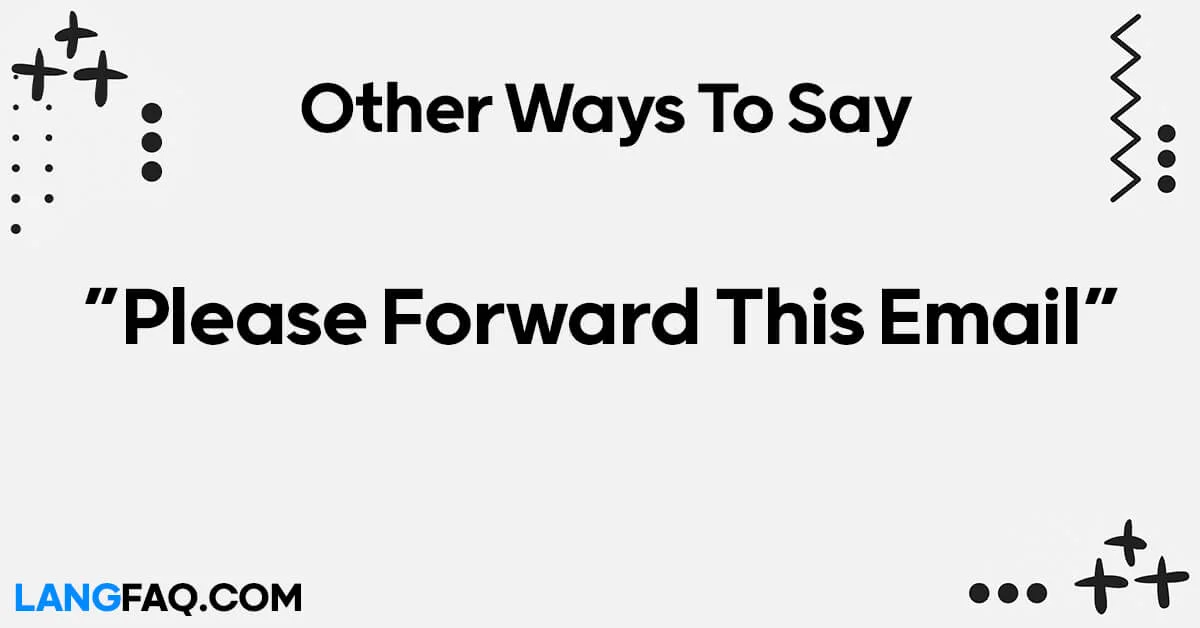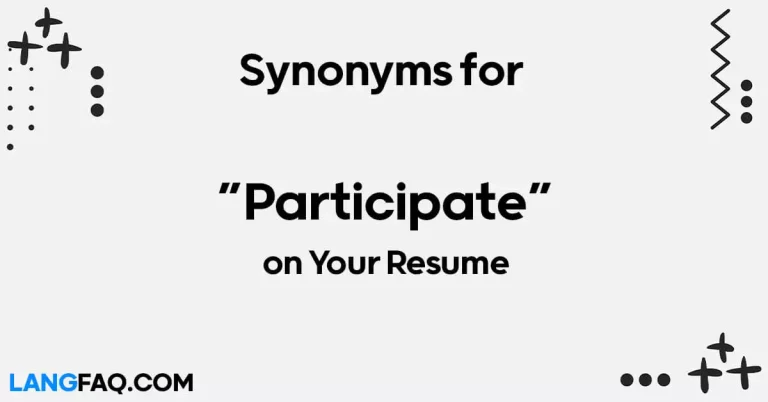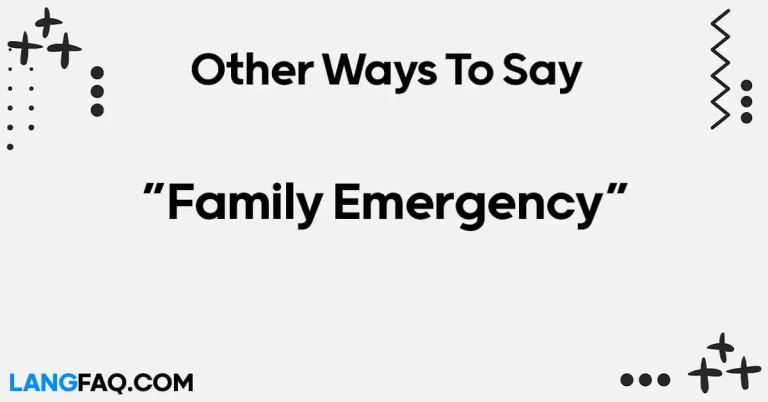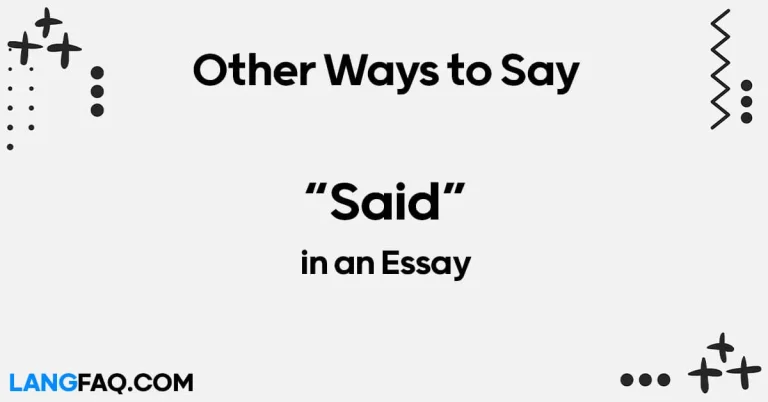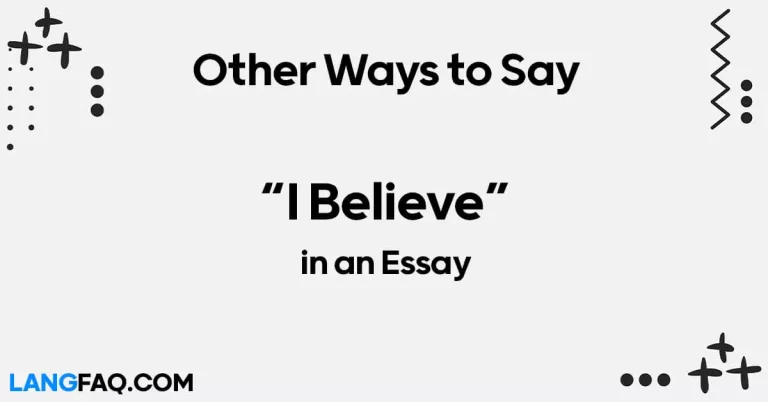Email etiquette is crucial in today’s digital age, and knowing how to politely request actions, such as forwarding an email, can significantly impact your professional communication. In this article, we delve into 12 alternative ways to phrase the request “Please forward this email.” These alternatives not only add variety to your language but also demonstrate your versatility and thoughtfulness in communication. Let’s explore how these subtle variations can enhance your email correspondence.
12 Other Ways to Say “Please Forward This Email”
Here are 12 alternative ways to say “Please forward this email”:
- Kindly send this email along.
- Could you pass on this email, please?
- I’d appreciate it if you could forward this email.
- Would you mind sharing this email?
- Can you send this email to [recipient]?
- It would be great if you could forward this email.
- May I ask you to forward this email?
- Sharing this email would be greatly appreciated.
- Could you send this email along for me?
- I need your help passing along this email.
- Would it be possible for you to forward this email?
- Can you make sure this email gets to [recipient]?
Here’s a table with the meaning and examples of 12 alternative ways to say “Please forward this email”:
| Alternative Phrase | Meaning | Example |
|---|---|---|
| Kindly send this email along. | Polite request for email forwarding. | “Kindly send this email along to the team.” |
| Could you pass on this email, please? | Polite request to forward the email. | “Could you pass on this email, please?” |
| I’d appreciate it if you could forward this email. | Request with appreciation for forwarding. | “I’d appreciate it if you could forward this email.” |
| Would you mind sharing this email? | Polite inquiry about forwarding the email. | “Would you mind sharing this email with the group?” |
| Can you send this email to [recipient]? | Direct request to send the email. | “Can you send this email to John?” |
| It would be great if you could forward this email. | Request with positive tone for forwarding. | “It would be great if you could forward this email.” |
| May I ask you to forward this email? | Polite inquiry seeking email forwarding. | “May I ask you to forward this email to Sarah?” |
| Sharing this email would be greatly appreciated. | Expressing gratitude for email forwarding. | “Sharing this email would be greatly appreciated.” |
| Could you send this email along for me? | Polite request to send the email. | “Could you send this email along for me, please?” |
| I need your help passing along this email. | Request for assistance in forwarding the email. | “I need your help passing along this email to Tom.” |
| Would it be possible for you to forward this email? | Polite inquiry about email forwarding. | “Would it be possible for you to forward this email?” |
| Can you make sure this email gets to [recipient]? | Request to ensure email delivery. | “Can you make sure this email gets to the boss?” |
Mastering alternative phrases for requesting email forwarding not only adds variety to your communication but also demonstrates your politeness and consideration towards others. By incorporating these phrases into your emails, you can enhance your professional relationships and communication effectiveness.
Is It Correct to Say “Please Forward This Email”?
Yes, “Please forward this email” is a correct and commonly used phrase in English. It is a polite and direct way to request someone to send the email to another recipient or group of recipients. This phrase is commonly used in both formal and informal settings, such as in professional correspondence, personal emails, and group communications. It clearly communicates the action desired without being overly formal or informal, making it suitable for a wide range of situations.
Professional Mail Example With “Please Forward This Email”
Subject: Request for Assistance: Please Forward This Email
Dear [Recipient’s Name],
I hope this email finds you well. I am writing to request your assistance with forwarding an important email to the relevant stakeholders.
The email in question contains updates regarding our upcoming project deadline and requires the attention of our team members. As I am currently occupied with another urgent task, I kindly ask if you could please forward this email to the team on my behalf.
Your assistance in ensuring that this information reaches the appropriate individuals in a timely manner would be greatly appreciated. If you have any questions or require further clarification, please do not hesitate to reach out to me.
Thank you for your cooperation and support.
Best regards, [Your Name]
1. Kindly send this email along.
When it comes to requesting someone to forward an email, using the word “kindly” adds a touch of politeness and courtesy to your message. This phrase is suitable for both formal and informal contexts, conveying respect for the recipient’s time and effort.
Scenario: Imagine you’re working on a group project with colleagues, and you need to share an important document with the team. Instead of simply instructing them to forward the email, you can use the phrase “kindly send this email along” to politely request their assistance.
Example Sentence: “Kindly send this email along to the entire team for review before our meeting tomorrow.”
Email Sample:
Subject: Request for Email Forwarding
Hi [Colleague’s Name],
I hope this email finds you well. Could you kindly send along the document I shared earlier to the rest of the team? Your assistance in distributing this information would be greatly appreciated.
Thank you, [Your Name]
Variations:
- “Could you kindly forward this email to [Recipient]?”
- “Would you be so kind as to send this email along?”
Pros:
- Adds a polite and respectful tone to your request.
- Demonstrates consideration for the recipient’s time.
- Suitable for various professional and personal contexts.
Cons:
- May sound overly formal in very casual settings.
- Could be perceived as insincere if overused.
Usage Tip:
- Reserve the use of “kindly” for situations where a formal tone is appropriate, such as professional correspondence or requests to acquaintances.
Definition:
According to the Cambridge Dictionary, “kindly” means in a way that shows understanding and sympathy towards someone’s feelings, or is (done) out of a desire to help people or be nice.
2. Could you pass on this email, please?
Asking someone to “pass on” an email is a casual yet polite way of requesting forwarding. This phrase is versatile and can be used in various contexts, from professional emails to personal messages among friends.
Scenario: Suppose you’re collaborating with a mentor on a project, and you need to share some relevant resources with them. Instead of using formal language, you can opt for a more casual approach by asking them to “pass on” the email.
Example Sentence: “Could you pass on this email to your contacts who might find this information useful?”
Email Sample:
Subject: Sharing Resource for Our Project
Hi [Mentor’s Name],
I came across an article that I believe could be beneficial for our project. Could you please pass on this email to any relevant contacts or colleagues who might find it useful?
Thanks, [Your Name]
Variations:
- “Can you pass this email along to others in your network?”
- “Would you mind passing on this email to anyone who might be interested?”
Pros:
- Strikes a balance between formality and informality.
- Suitable for both professional and personal communication.
- Conveys a sense of collaboration and shared responsibility.
Cons:
- May be considered too casual for very formal or hierarchical relationships.
- Requires a certain level of familiarity with the recipient.
Usage Tip:
- Use “pass on” in situations where a friendly and approachable tone is desired, such as interactions with mentors, colleagues, or friends.
Definition:
According to the Merriam-Webster Dictionary, “pass on” means to give or convey (something, such as a message) to another person or group.
3. I’d appreciate it if you could forward this email.
Expressing appreciation while making a request adds a layer of gratitude and respect to your message. This phrase acknowledges the recipient’s assistance in advance, fostering a positive exchange and strengthening professional relationships.
Scenario: Imagine you’re reaching out to a colleague for assistance with forwarding an email to a client. By expressing appreciation upfront, you convey gratitude for their help and professionalism.
Example Sentence: “I’d appreciate it if you could forward this email to the client with the updated proposal attached.”
Email Sample:
Subject: Assistance Needed: Email Forwarding
Hi [Colleague’s Name],
I hope you’re doing well. I have an urgent request regarding the proposal we discussed earlier. I’d appreciate it if you could forward this email to the client and ensure they receive the updated version.
Thank you in advance for your assistance.
Best regards, [Your Name]
Variations:
- “I’d be grateful if you could forward this email for me.”
- “Your help in forwarding this email would be greatly appreciated.”
Pros:
- Demonstrates gratitude and respect for the recipient’s assistance.
- Sets a positive tone for the request, fostering cooperation.
- Builds rapport and strengthens professional relationships.
Cons:
- May sound overly formal in very casual settings.
- Could be perceived as insincere if not genuine.
Usage Tip:
- Reserve this phrase for situations where you genuinely appreciate the recipient’s assistance and want to convey your gratitude sincerely.
Definition:
According to Oxford Languages, “appreciate” means recognize the full worth of or understand the importance of; be grateful for (something).
4. Would you mind sharing this email?
Inviting the recipient to participate in the action with a polite inquiry demonstrates respect for their autonomy and willingness to cooperate. This phrase is suitable for both formal and informal communication, making it versatile in various contexts.
Scenario: Suppose you’re collaborating with a peer on a project, and you need to forward an email containing important updates. By politely asking if they would mind sharing the email, you acknowledge their involvement and respect their decision.
Example Sentence: “Would you mind sharing this email with the rest of the team for their input?”
Email Sample:
Subject: Request for Email Sharing
Hi [Peer’s Name],
I hope you’re doing well. I wanted to get your input on the latest updates regarding our project. Would you mind sharing this email with the team for their feedback?
Thank you for your collaboration.
Best regards, [Your Name]
Variations:
- “Do you mind passing this email along to the team?”
- “Would it be possible for you to share this email with others?”
Pros:
- Demonstrates respect for the recipient’s autonomy and decision-making.
- Encourages cooperation and participation in the action.
- Suitable for various professional and personal contexts.
Cons:
- May sound overly formal in very casual settings.
- Requires a certain level of familiarity with the recipient.
Usage Tip:
- Use this phrase when you want to invite the recipient to participate in the action while maintaining a polite and respectful tone.
Definition:
According to Lexico, “would you mind” is used to politely ask someone to do something. It is often followed by a verb in the -ing form.
5. Can you send this email to [recipient]?
Directly requesting someone to send an email to a specific recipient is straightforward and effective. This phrase is suitable for both formal and informal situations, providing clear instructions while maintaining a polite tone.
Scenario: Imagine you’re delegating tasks to a team member, and you need them to send an email to a client. By using this phrase, you provide clear instructions and ensure that the email reaches the intended recipient.
Example Sentence: “Can you send this email to John and cc me on the correspondence?”
Email Sample:
Subject: Request for Email Distribution
Hi [Team Member’s Name],
I trust you’re well. Could you please send this email to John regarding the project updates? Kindly cc me on the correspondence for visibility.
Thank you for your assistance.
Best regards, [Your Name]
Variations:
- “Could you please forward this email to John?”
- “I need you to send this email to the client as soon as possible.”
Pros:
- Provides clear instructions for email distribution.
- Suitable for various professional contexts, including delegating tasks and requesting updates.
- Maintains a polite and respectful tone while being direct.
Cons:
- May be perceived as too formal in very casual settings.
- Requires specifying the recipient, which may not always be necessary.
Usage Tip:
- Use this phrase when you need to delegate email tasks or provide clear instructions for email distribution.
Definition:
According to the Cambridge Dictionary, “can you” is a way of asking someone to do something, especially in a situation where you think they might not want to do it.
6. It would be great if you could forward this email.
Expressing the potential positive outcome of the action while making a request adds a friendly and optimistic tone to your message. This phrase encourages cooperation and conveys appreciation for the recipient’s assistance.
Scenario: Suppose you’re coordinating with a colleague on a project, and you need them to forward an email to the team. By using this phrase, you highlight the positive impact of their action and encourage them to help.
Example Sentence: “It would be great if you could forward this email to the team before our meeting tomorrow.”
Email Sample:
Subject: Request for Email Forwarding
Hi [Colleague’s Name],
I hope you’re doing well. We have an important update to share with the team before our meeting tomorrow. It would be great if you could forward this email to ensure everyone is informed.
Thank you for your support.
Best regards, [Your Name]
Variations:
- “I’d really appreciate it if you could forward this email.”
- “Your assistance in forwarding this email would be fantastic.”
Pros:
- Sets a positive and optimistic tone for the request.
- Conveys appreciation for the recipient’s assistance.
- Encourages cooperation and willingness to help.
Cons:
- May sound overly casual in very formal settings.
- Could be perceived as insincere if not genuine.
Usage Tip:
- Use this phrase when you want to convey appreciation for the recipient’s assistance and encourage them to help.
Definition:
According to the Merriam-Webster Dictionary, “great” means notably large in size; of a kind characterized by relative largeness.
7. May I ask you to forward this email?
Seeking permission before making a request adds a level of politeness and respect to your message. This phrase is suitable for formal contexts or when addressing individuals in positions of authority.
Scenario: Imagine you’re reaching out to your supervisor for assistance with forwarding an email to the team. By using this phrase, you acknowledge their authority and seek permission before making the request.
Example Sentence: “May I ask you to forward this email to the team members for their review?”
Email Sample:
Subject: Request for Email Forwarding
Dear [Supervisor’s Name],
I hope this email finds you well. I have an important update to share with the team and would like to request your assistance. May I ask you to forward this email to the team members for their review and input?
Thank you for your consideration.
Best regards, [Your Name]
Variations:
- “Could I trouble you to forward this email for me?”
- “Would it be possible for you to forward this email to the team?”
Pros:
- Shows respect for the recipient’s authority and position.
- Demonstrates politeness and consideration in making the request.
- Suitable for formal contexts or when addressing individuals in positions of authority.
Cons:
- May sound overly formal in very casual settings.
- Could be perceived as unnecessarily deferential in certain situations.
Usage Tip:
- Use this phrase when addressing individuals in positions of authority or in formal contexts to show respect and politeness.
Definition:
According to the Oxford Languages, “may I” is used to ask for permission in a formal way.
8. Sharing this email would be greatly appreciated.
Expressing appreciation for the recipient’s assistance in advance adds a positive and grateful tone to your message. This phrase acknowledges the importance of their help and encourages cooperation.
Scenario: Suppose you’re coordinating with a colleague on a project, and you need them to forward an email to the team. By using this phrase, you convey gratitude for their assistance and emphasize the significance of their help.
Example Sentence: “Sharing this email would be greatly appreciated, as it contains important updates for the team.”
Email Sample:
Subject: Request for Email Sharing
Hi [Colleague’s Name],
I trust you’re doing well. We have some critical updates to share with the team regarding our project progress. Sharing this email would be greatly appreciated, as it will ensure everyone is informed and aligned.
Thank you for your support.
Best regards, [Your Name]
Variations:
- “Your assistance in sharing this email would be highly valued.”
- “We would be grateful if you could share this email with the team.”
Pros:
- Conveys appreciation for the recipient’s assistance.
- Encourages cooperation and willingness to help.
- Sets a positive and grateful tone for the request.
Cons:
- May sound overly formal in very casual settings.
- Could be perceived as insincere if not genuine.
Usage Tip:
- Use this phrase when you want to convey appreciation for the recipient’s assistance and emphasize the importance of their help.
Definition:
According to Lexico, “greatly” means to a great extent or degree; much.
9. Could you send this email along for me?
Requesting someone to send an email along on your behalf is a polite and indirect way of asking for assistance. This phrase is suitable for various contexts, from professional emails to personal messages among friends.
Scenario: Imagine you’re collaborating with a colleague on a project, and you need them to forward an email containing important updates. By using this phrase, you politely ask for their assistance without imposing a direct obligation.
Example Sentence: “Could you send this email along for me? It contains some updates that I think the team should be aware of.”
Email Sample:
Subject: Assistance Needed, Email Forwarding
Hi [Colleague’s Name],
I hope you’re doing well. I wanted to ask for your assistance with forwarding an email to the team. Could you please send this email along for me? Your help would be greatly appreciated.
Thank you for your support.
Best regards, [Your Name]
Variations:
- “Would you mind sending this email along to the team?”
- “Could you please forward this email on my behalf?”
Pros:
- Politely asks for assistance without imposing a direct obligation.
- Suitable for various professional and personal contexts.
- Maintains a respectful and courteous tone.
Cons:
- May require additional context to ensure clarity.
- Could be perceived as too indirect in certain situations.
Usage Tip:
- Use this phrase when you want to politely ask for assistance with forwarding an email without imposing a direct obligation on the recipient.
Definition:
According to the Cambridge Dictionary, “could” is used to politely ask someone to do something.
10. I need your help passing along this email.
Acknowledging the recipient’s assistance as valuable and significant demonstrates humility and respect for their capabilities. This phrase fosters a sense of partnership and shared responsibility in achieving a common goal.
Scenario: Suppose you’re coordinating with a team member on a project, and you need them to forward an email containing important updates. By using this phrase, you acknowledge their role and express your reliance on their assistance.
Example Sentence: “I need your help passing along this email to the rest of the team. Your input is crucial for ensuring everyone is on the same page.”
Email Sample:
Subject: Request for Email Distribution
Hi [Team Member’s Name],
I hope you’re doing well. We have some important updates to share with the team regarding our project progress. I need your help passing along this email to ensure everyone is informed and aligned. Your input is crucial for our success.
Thank you for your collaboration.
Best regards, [Your Name]
Variations:
- “Your assistance in passing along this email would be invaluable.”
- “Could you please help me by forwarding this email to the team?”
Pros:
- Acknowledges the recipient’s role and contribution in achieving a common goal.
- Fosters a sense of partnership and shared responsibility.
- Demonstrates humility and respect for the recipient’s capabilities.
Cons:
- May require additional context to ensure clarity.
- Could be perceived as overly dependent on the recipient’s assistance.
Usage Tip:
- Use this phrase when you want to acknowledge the recipient’s role and express your reliance on their assistance in achieving a common goal.
Definition:
According to the Merriam-Webster Dictionary, “help” means to make more pleasant or bearable; improve or relieve.
11. Would it be possible for you to forward this email?
Asking if it’s possible for the recipient to forward the email adds a polite and considerate tone to your request. This phrase shows respect for the recipient’s time and discretion, giving them the option to decline if necessary.
Scenario: Imagine you’re reaching out to a colleague for assistance with forwarding an email to a client. By using this phrase, you acknowledge their busy schedule and give them the opportunity to assess their availability before agreeing to help.
Example Sentence: “Would it be possible for you to forward this email to the client with the updated proposal attached? I understand if you’re busy, so please let me know.”
Email Sample:
Subject: Request for Email Forwarding
Hi [Colleague’s Name],
I trust you’re well. I have an urgent request regarding the proposal we discussed earlier. Would it be possible for you to forward this email to the client with the updated version attached? I understand if you’re busy, so please let me know.
Thank you for considering my request.
Best regards, [Your Name]
Variations:
- “Could you possibly forward this email to the client?”
- “I was wondering if it would be possible for you to help me by forwarding this email.”
Pros:
- Shows respect for the recipient’s time and discretion.
- Gives the recipient the option to decline if necessary.
- Maintains a polite and considerate tone.
Cons:
- May sound overly formal in very casual settings.
- Could be perceived as indirect if not accompanied by a clear request.
Usage Tip:
- Use this phrase when you want to request assistance with forwarding an email while showing respect for the recipient’s time and discretion.
Definition:
According to the Oxford Languages, “possible” means able to be done; within the power or capacity of someone or something.
12. Can you make sure this email gets to [recipient]?
Requesting assurance that the email reaches the intended recipient emphasizes the importance of timely and accurate communication. This phrase conveys trust in the recipient’s ability to ensure the email’s delivery.
Scenario: Suppose you’re delegating tasks to a team member, and you need them to ensure that an important email reaches the intended recipient. By using this phrase, you emphasize the significance of the email’s delivery and trust the recipient to handle the task effectively.
Example Sentence: “Can you make sure this email gets to John? It contains time-sensitive information that he needs to be aware of.”
Email Sample:
Subject: Urgent: Delivery Confirmation Needed
Hi [Team Member’s Name],
I hope you’re well. I’m reaching out regarding an email that needs to reach John as soon as possible. Can you make sure this email gets to him? It contains time-sensitive information that he needs to be aware of.
Thank you for your attention to this matter.
Best regards, [Your Name]
Variations:
- “Could you ensure that this email reaches John?”
- “I need you to confirm that this email has been delivered to the intended recipient.”
Pros:
- Emphasizes the importance of timely and accurate communication.
- Conveys trust in the recipient’s ability to ensure the email’s delivery.
- Provides clear instructions for the recipient to follow.
Cons:
- May sound overly directive if not accompanied by a clear rationale.
- Could be perceived as micromanaging in certain situations.
Usage Tip:
- Use this phrase when you want to emphasize the importance of ensuring that an email reaches the intended recipient in a timely and accurate manner.
Definition:
According to the Cambridge Dictionary, “make sure” means to take action so that you are certain that something happens, is true, etc.
FAQs
- How do polite requests impact professional relationships? Polite requests demonstrate respect and consideration, fostering positive professional relationships built on mutual trust and cooperation.
- What if the recipient doesn’t respond to my request? If the recipient doesn’t respond promptly, it’s advisable to follow up politely, acknowledging their busy schedule and expressing gratitude for their attention.
- Can I use these phrases in personal communication as well? While these phrases are tailored for professional settings, they can also be used in personal communication to convey politeness and consideration.
- Are there any cultural considerations when using these phrases? It’s essential to be mindful of cultural differences in communication norms and adjust your language accordingly to ensure respectful and effective communication.
- How can I practice incorporating these phrases into my emails? Start by using these phrases in your everyday communication, both in professional and personal contexts, to familiarize yourself with their usage and nuances.
- What if I receive a request to forward an email? If you receive a request to forward an email, respond promptly and courteously, acknowledging the request and confirming your assistance.
Conclusion
Mastering the art of polite communication is essential for navigating professional relationships successfully. By incorporating these alternative phrases into your email requests, you can demonstrate thoughtfulness, respect, and professionalism, fostering positive and productive interactions.

